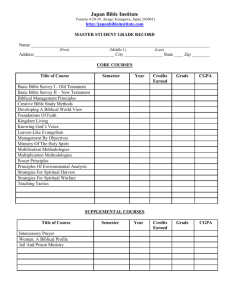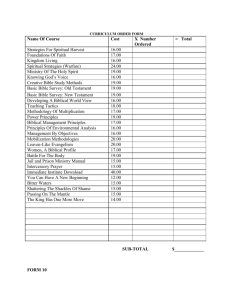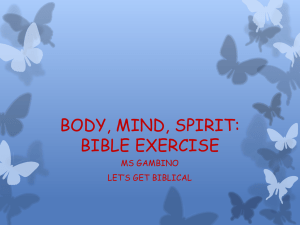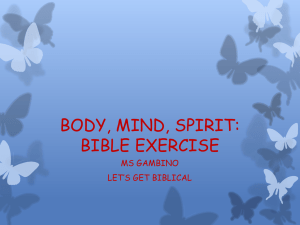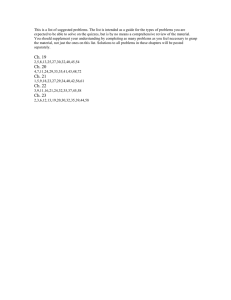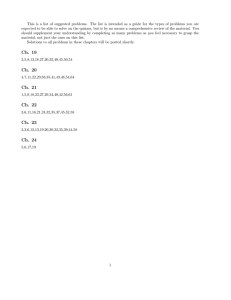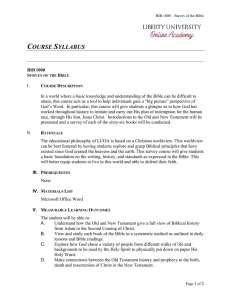Document 15715212
advertisement
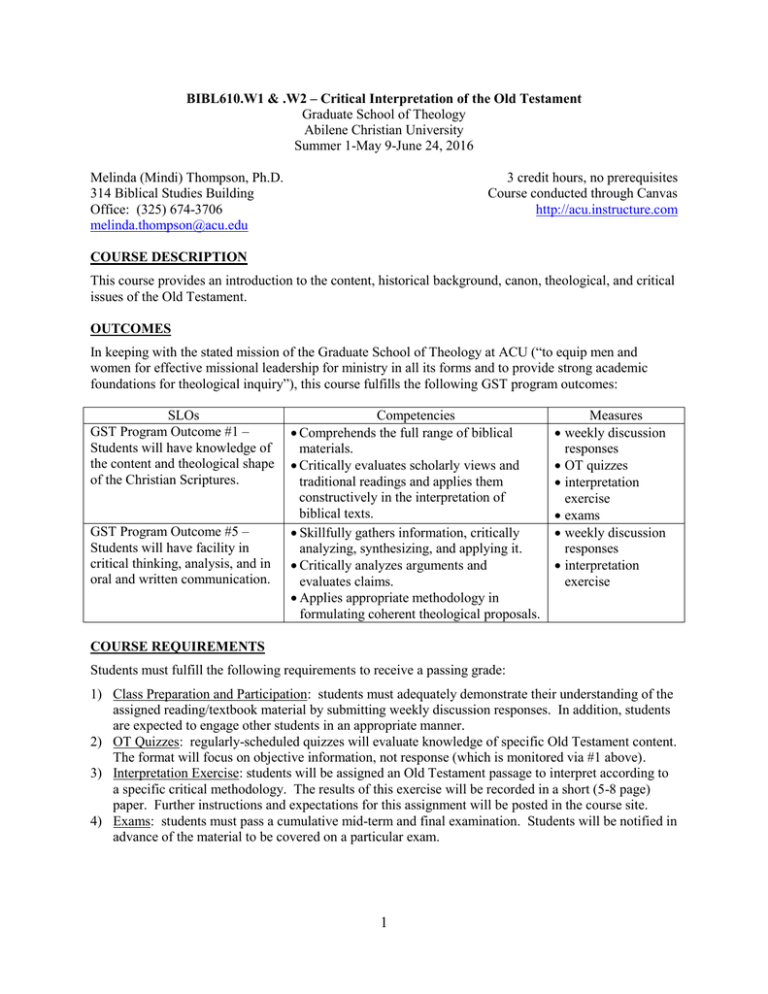
BIBL610.W1 & .W2 – Critical Interpretation of the Old Testament Graduate School of Theology Abilene Christian University Summer 1-May 9-June 24, 2016 Melinda (Mindi) Thompson, Ph.D. 314 Biblical Studies Building Office: (325) 674-3706 melinda.thompson@acu.edu 3 credit hours, no prerequisites Course conducted through Canvas http://acu.instructure.com COURSE DESCRIPTION This course provides an introduction to the content, historical background, canon, theological, and critical issues of the Old Testament. OUTCOMES In keeping with the stated mission of the Graduate School of Theology at ACU (“to equip men and women for effective missional leadership for ministry in all its forms and to provide strong academic foundations for theological inquiry”), this course fulfills the following GST program outcomes: SLOs GST Program Outcome #1 – Students will have knowledge of the content and theological shape of the Christian Scriptures. GST Program Outcome #5 – Students will have facility in critical thinking, analysis, and in oral and written communication. Competencies Comprehends the full range of biblical materials. Critically evaluates scholarly views and traditional readings and applies them constructively in the interpretation of biblical texts. Skillfully gathers information, critically analyzing, synthesizing, and applying it. Critically analyzes arguments and evaluates claims. Applies appropriate methodology in formulating coherent theological proposals. Measures weekly discussion responses OT quizzes interpretation exercise exams weekly discussion responses interpretation exercise COURSE REQUIREMENTS Students must fulfill the following requirements to receive a passing grade: 1) Class Preparation and Participation: students must adequately demonstrate their understanding of the assigned reading/textbook material by submitting weekly discussion responses. In addition, students are expected to engage other students in an appropriate manner. 2) OT Quizzes: regularly-scheduled quizzes will evaluate knowledge of specific Old Testament content. The format will focus on objective information, not response (which is monitored via #1 above). 3) Interpretation Exercise: students will be assigned an Old Testament passage to interpret according to a specific critical methodology. The results of this exercise will be recorded in a short (5-8 page) paper. Further instructions and expectations for this assignment will be posted in the course site. 4) Exams: students must pass a cumulative mid-term and final examination. Students will be notified in advance of the material to be covered on a particular exam. 1 GRADING Course grades will be based on the following: 1) 2) 3) 4) Preparation/Participation – 30% Quizzes – 20% Interpretation Exercise – 20% Exams – 30% [15% for each exam] The grading scale and standards utilized in this course are provided below. A = 90-100 Excellent – covers full range of material, displays depth of comprehension. Written work is perfect or nearly perfect in grammar, spelling, and usage. B = 80-89 Good – but not superior, reflects comprehension of most crucial aspects of material only. Very few grammar, spelling, or usage errors. C = 70-79 Decent – competent in most aspects but with significant lapses. Multiple grammar, spelling, or usage errors. D = 60-69 Uh-Oh – some effort shown but overwhelmed by flaws in thinking. Major mistakes in grammar, spelling, or usage. F = <59 No – don’t make me go here. TEXTBOOKS The following books are required for class participation: Any good study Bible. Among those considered “good” (i.e., scholarly rather than devotional in nature) are The HarperCollins Study Bible (NRSV), The New Oxford Annotated Bible (NRSV), and The NIV Study Bible. Students wishing to use a Bible other than those listed here should consult with the instructor. Steven L. McKenzie and Stephen R. Haynes, eds., To Each Its Own Meaning: An Introduction to Biblical Criticisms and Their Application, revised and expanded ed. Louisville: Westminster/John Knox Press, 1999. Bruce C. Birch, Walter Brueggemann, Terence E. Fretheim, and David L. Petersen, A Theological Introduction to the Old Testament, 2nd edition. Nashville: Abingdon Press, 2005. ADMINISTRATIVE INFORMATION 1) Contact Expectations: Dr. Thompson may be reached most readily via email, which is her preferred method of communication. Phone or Skype/Google Hangout conversations to discuss course material or for individual tutoring should be scheduled in advance. 2) Participation: The cumulative nature of this graduate-level course makes regular participation a must. Students must check the course site regularly and work diligently to engage new material. Students whose participation is limited due to illness or other unforeseen circumstances should notify the instructor as soon as possible to make arrangements to submit assignments after the deadline. 3) Inclusive Language: Every attempt will be made to use inclusive language, as this concern influences not only classroom assignments but also our interpretation of the Bible. Exceptions to this policy will be made for translation accuracy only. Students who persist in using non-inclusive language after the instructor’s correction will receive a reduction in grade. 4) Course Deadlines: Quizzes and exams must be taken the week they are given to avoid falling behind. Exceptions to this policy may be made for serious unforeseen circumstances with prior permission of the instructor. Exceptions will not be made after the deadline has been missed. Weekly assignments turned in after the deadline will receive half credit. 2 5) GST Pathways: Students in need of a BIBL Pathways assignment should consult with the instructor within the first two weeks of the term. An adjustment may be made to the interpretation assignment to reflect the student’s ministry context and vocational goals. 6) Special Needs Policy: ACU complies with the Americans with Disabilities Act in making reasonable accommodation for qualified students with a disability. If you have a documented disability and wish to discuss academic accommodation, please contact the ACU Student Disability Services Office (a part of the Alpha Scholars Program). In order to receive accommodation, you must be registered with Disability Services and you must complete a specific request for each class in which you need accommodation. Call (325) 674-2667 for an appointment with the Director of Disability Services. 7) Academic Integrity Policy: Definitions and consequences are posted at http://www.acu.edu/academics/provost/documents/AcademicIntegrityPolicy.pdf 8) Subject to Change Clause: This syllabus, course calendar, and other attending documents are subject to change during the course. Every attempt will be made to notify students promptly when changes are made. 9) GST Classroom Virtues: The GST invites students to participate in a process of theological and spiritual formation. Knowing how to think theologically comes by habit and by imitation, not simply by acquiring isolated facts. The assumption here is that books alone are insufficient for addressing difficulties of life and forming people into the image and likeness of God. Ultimately, we strive to form communities of inquiry, inviting you to inhabit a shared world of learning. Within such an environment, the goal is to cultivate critical skills of reflection, spiritual disciplines, interact authentically with one another, and learn to function as a community of inquiry. A large part of this involves connecting areas of life rather than pitting them against one another. Prayer, study, and other dimensions of life are all integral to the process of formation. Consequently, we invite you to participate in a set of practices; nurtured within this context, you pursue “intellectual, moral, spiritual excellence” the result of which is the formation of the whole person. a. Desire for truth in the context of love—the aptitude to discern whether belief-forming processes, practices, and people yield true beliefs over false ones. People motivated by this desire will be more likely to conduct thorough inquiries, scrutinize evidence carefully, investigate numerous fields of study, and consider alternative explanations while respecting and caring for others. b. Humility—the capacity to recognize reliable sources of informed judgment while recognizing the limits of our knowledge and the fallibility of our judgments. This is not created in isolation but takes into account feedback and correction from other sources of informed judgment. c. Honesty—the capacity to tackle difficult questions without seeking simple answers. Ignoring complex and difficult questions only solidifies vices such as intellectual dishonesty, closemindedness, and rash judgments. These vices preclude the possibility of refining our thinking and of participating in conversations with others. d. Openness—the desire to engage in an open-ended search for knowledge of God, including receptivity to different ideas, experiences, and people. Listening becomes a discipline that acknowledges the other and respects diversity. The art of being a student and a teacher is an ongoing process that necessitates hospitality, patience, and love. e. Courage—the ability to articulate one’s position while considering other perspectives. The aptitude to express convictions involves risk yet fosters opportunities for meaningful dialog. Responding to objections entails tenacity but should not be confused with close-mindedness. f. Wisdom—the capacity to offer a synthetic discernment of knowledge on behalf of the community. The aim is not merely the dissemination of information but a pastoral implementation of faith for the building up of the community. It solidifies various pieces of data, practices, and experiences and aptly applies knowledge and faith to particular situations. g. Stewardship—the commitment to one’s accountability to the gifts and responsibilities that one brings to the classroom. Classroom engagement includes proactively participating in the course goals, seeking mastery of course competencies, and collaborating with faculty and fellow students in the development of a learning environment. Committing oneself to spiritual and intellectual wellbeing and growth is a faithful response to the opportunities graduate education affords. 3 h. Hopefulness—the receptivity to the future possibilities of God. The cultivation of thankfulness for our heritages and expectation for our future ministries engenders a guard against cynicism and a spirit of perseverance during times of stress and disorientation. i. Prayerfulness—the making of space to commune with God. The task of learning and teaching so that we are formed into the image of Christ through the Spirit involves our consistent reliance on God’s sanctifying work. COURSE SCHEDULE The course calendar below provides a brief overview of the subject to be covered during the week of study. Instructions for response and quiz/exam preparation will be discussed in class. WEEK 1 – May 9 SUBJECT Course Introduction, Pentateuch 2 – May 16 Conquest, Monarchy 3 – May 23 5 – June 6 Biblical Criticisms part 1: Author-Centered, Text-Centered Biblical Criticisms part 2: Reader-Centered Mid-Term Exam Exile, Wisdom 6 – June 13 Return 7 – June 20 Final Exam, Course Evaluation 4 – May 30 READING BBFP chapters 1-5 Genesis, Exodus, Leviticus, Numbers, Deuteronomy Recommended: Atrahasis Epic, Epic of Gilgamesh BBFP chapters 6-9 Joshua, Judges, 1-2 Samuel, 1-2 Kings, Isaiah 1-39, Hosea, Amos, Micah, Zephaniah McKenzie/Haynes chapters 1-8 McKenzie/Haynes chapters 9-14 BBFP chapters 10-11 Job, Proverbs, Ecclesiastes, Isaiah 40-55, Jeremiah, Lamentations, Ezekiel, Nahum, Habakkuk BBFP chapter 12 Ruth, 1-2 Chronicles, Ezra, Nehemiah, Esther, Psalms, Song of Solomon, Isaiah 56-66, Daniel, Joel, Obadiah, Jonah, Haggai, Zechariah, Malachi Interpretation Exercise due June 26 BIBLIOGRAPHY Students are encouraged to consult the excellent bibliographies and resource lists in their textbooks. Specific recommendations for further study may be solicited by contacting the instructor. 4
